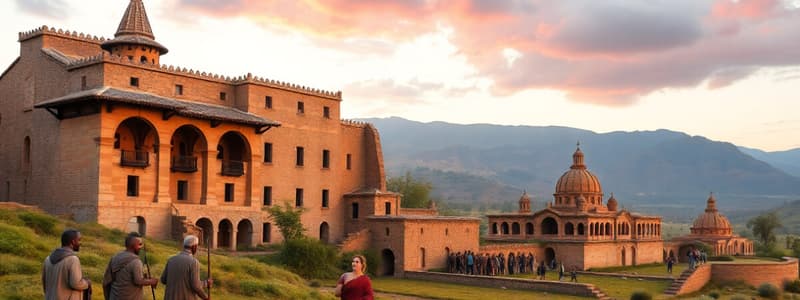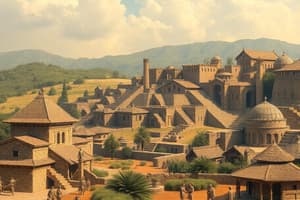Podcast
Questions and Answers
Which period is characterized by the rise of feudalism and the spread of major religions during the 5th to late 15th centuries?
Which period is characterized by the rise of feudalism and the spread of major religions during the 5th to late 15th centuries?
- Classical Antiquity
- Middle Ages (correct)
- Renaissance
- Modern History
What is the primary focus of historiography?
What is the primary focus of historiography?
- Understanding social change
- Studying methods of writing and interpreting history (correct)
- Analyzing primary sources
- Examining economic systems
Which civilization is NOT classified under Ancient History?
Which civilization is NOT classified under Ancient History?
- Indus Valley
- Ancient Egypt
- Mesoamerica
- Norse Civilization (correct)
Which of the following best describes the Renaissance period?
Which of the following best describes the Renaissance period?
What significant historical event marks the transition into Modern History?
What significant historical event marks the transition into Modern History?
Which method involves understanding events within their historical context to grasp their significance?
Which method involves understanding events within their historical context to grasp their significance?
Which theme in history focuses primarily on the influence of ideas and customs between cultures?
Which theme in history focuses primarily on the influence of ideas and customs between cultures?
In which historical period did significant figures like Homer and Socrates emerge?
In which historical period did significant figures like Homer and Socrates emerge?
What is a key characteristic of primary sources in historical research?
What is a key characteristic of primary sources in historical research?
Which of the following was NOT a major civilization during Ancient History?
Which of the following was NOT a major civilization during Ancient History?
Flashcards are hidden until you start studying
Study Notes
Overview of History
- Definition: The study of past events, particularly in human affairs.
- Purpose: To understand societies, cultures, politics, economies, and human behavior over time.
Key Periods in History
-
Prehistory
- Time before written records.
- Includes the Stone Age, Bronze Age, and Iron Age.
-
Ancient History
- Begins with the invention of writing (~3000 BCE).
- Major civilizations: Mesopotamia, Ancient Egypt, Indus Valley, Ancient China, Mesoamerica.
-
Classical Antiquity
- Roughly 8th century BCE to 5th century CE.
- Dominated by the Roman Empire, Greek city-states, and the Persian Empire.
-
Middle Ages
- Approximately 5th to late 15th century.
- Rise of feudalism, spread of Christianity and Islam, and the Byzantine Empire.
-
Renaissance
- 14th to 17th century.
- Revival of classical learning, art, and humanism in Europe.
-
Modern History
- Late 15th century to present.
- Significant events: Industrial Revolution, World Wars, Cold War, globalization.
Important Concepts
- Historiography: The study of the methods and principles through which history is written and interpreted.
- Primary Sources: Original documents or evidence from the time period being studied (e.g., letters, photographs).
- Secondary Sources: Interpretations or analyses based on primary sources (e.g., textbooks, articles).
Major Themes in History
- Cultural Exchange: Spread of ideas, customs, and technologies across cultures.
- Conflict and Conquest: Wars and territorial expansions that shape nations.
- Social Change: Movements for rights and reforms (e.g., civil rights, feminism).
- Economic Systems: Development of trade, capitalism, socialism, and globalization.
Historical Methods
- Chronology: Establishing a timeline of events.
- Comparative Analysis: Examining similarities and differences across different times and places.
- Contextualization: Understanding events within their historical context to grasp significance.
Importance of Studying History
- Provides insight into human behavior and societal development.
- Helps foster critical thinking and analytical skills.
- Encourages an understanding of contemporary issues through historical perspective.
Overview of History
- History examines past events, focusing on human affairs and societal developments.
- Aims to understand cultures, politics, economies, and human behaviors over time.
Key Periods in History
-
Prehistory:
- Era before written records, encompassing the Stone Age, Bronze Age, and Iron Age.
-
Ancient History:
- Commences around 3000 BCE with the advent of writing.
- Notable civilizations include Mesopotamia, Ancient Egypt, Indus Valley, Ancient China, and Mesoamerica.
-
Classical Antiquity:
- Spans approximately from the 8th century BCE to the 5th century CE.
- Characterized by influential powers such as the Roman Empire, Greek city-states, and the Persian Empire.
-
Middle Ages:
- Covers roughly the 5th to late 15th century.
- Marked by the rise of feudalism and the spread of major religions like Christianity and Islam, alongside the prominence of the Byzantine Empire.
-
Renaissance:
- Occurs from the 14th to the 17th century.
- Recognized for a resurgence of classical learning, art, and humanistic thought throughout Europe.
-
Modern History:
- Encompasses the late 15th century to the present day.
- Features pivotal events such as the Industrial Revolution, World Wars, Cold War, and increasing globalization.
Important Concepts
-
Historiography:
- Involves the study of historical writing methods and interpretative frameworks.
-
Primary Sources:
- Original materials from the time being studied, including letters and photographs that provide firsthand evidence.
-
Secondary Sources:
- Analyses or interpretations based on primary sources, found in textbooks and scholarly articles.
Major Themes in History
-
Cultural Exchange:
- The dissemination of ideas, customs, and technologies between different cultures.
-
Conflict and Conquest:
- Armed conflicts and territorial expansions that influence national identities and boundaries.
-
Social Change:
- Movements advocating for reforms and rights, such as civil rights and feminism.
-
Economic Systems:
- Evolution of trade, capitalism, socialism, and the processes of globalization over time.
Historical Methods
-
Chronology:
- The practice of arranging events in chronological order to establish a timeline.
-
Comparative Analysis:
- A method for identifying similarities and differences across various historical contexts.
-
Contextualization:
- Understanding events within their specific historical settings to better appreciate their significance.
Importance of Studying History
- Offers valuable insights into human behavior and the progression of societies.
- Enhances critical thinking and analytical skills needed for historical inquiry.
- Provides a perspective on current issues through the lens of historical events.
Studying That Suits You
Use AI to generate personalized quizzes and flashcards to suit your learning preferences.



